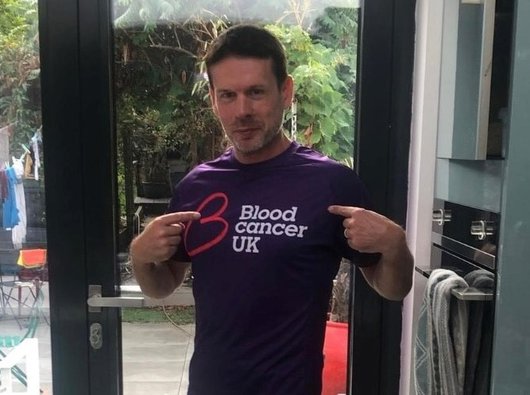Looking after yourself with ET
Many people who are diagnosed with blood cancer want to know if there is anything they can do to help themselves.
Why it's important to look after yourself
We don’t yet fully understand why people get ET, and it’s important to realise that your lifestyle hasn’t caused it. But there are simple things you can do which may make a difference to how you feel, mentally and physically, after your diagnosis. This is the case whatever type of treatment is recommended for you.
Staying hydrated
It’s good for everyone to drink plenty of fluids, but it’s particularly important if you have a high level of platelets.
The NHS’s Eatwell Guide recommends drinking 6 to 8 glasses of water, or other low fat and low sugar drinks, every day. This includes tea and coffee (as long as the milk is low fat and you don’t add sugar).
Ask your hospital team to advise how much fluid you should be aiming to drink each day.
Stopping smoking
Smoking increases your risk of thrombosis (blood clots). As ET also increases this risk, it’s important for smokers with ET to stop, or at least cut down.
This may not be easy, particularly if you’re feeling shocked and anxious about your diagnosis, but there are services that can help. The NHS offers advice and support to stop smoking, including ways to quit, a free app, and information on local services.
Keeping active
It’s important to stay as active as you can, even if the ET or your treatment is making you feel tired. Exercise can help to boost your mood as well your overall fitness – and you don’t have to do anything high impact. Gentle exercise such as yoga can be effective.
Choose something that you like doing or can incorporate easily into your daily routine, like gardening, walking or following an exercise video at home.
See our ideas about how to stay active safely when you have blood cancer.
"Exercise helps a lot. Until you get an injury you don’t realise how important it is and what you miss. Just getting out in the morning. If I don't, I don't feel set up for the day."
Ed, living with ET since 2022
Read Ed's story about how running came to the rescue

Managing fatigue
Fatigue is a type of extreme tiredness that doesn’t always get better with rest and can come on suddenly. Fatigue can make you feel mentally as well physically exhausted. You can’t always tell when it’s going to come on and it doesn’t relate directly to your blood counts.
Exercise might feel like the last thing you want to do, but there’s evidence that activity actually helps with fatigue. Many people with blood cancer agree that gentle exercise such as walking can make a difference to how they feel. They also say they learn to pace themselves and not take on too much.
Read our information about managing fatigue.
Eating healthily
It’s important to eat well and enjoy what you eat. Unless your hospital team gives you special instructions, it’s best to follow general advice on eating a healthy, balanced diet and sticking to food safety guidelines.
We have more information about eating well with blood cancer.
Looking after your mental health
Knowing you have blood cancer can be stressful, even if it’s a chronic condition and can be controlled effectively. You may feel upset, shocked or frightened when you are diagnosed.
Some people are relieved when they get a diagnosis of ET, because at least they know what’s wrong. They feel they could have a “worse” type of cancer.
However you feel, someone else with blood cancer will recognise the feelings you’re having. It’s also normal for your mood to go up and down and for you to feel different things at different times.
We have information and guidance on looking after your mental health with blood cancer. We also have an online community forum where you can talk to other people who will understand.

Talk to other people affected by blood cancer
Hear from and connect with people who understand.
Getting vaccinated
Because your immune system may be weakened by the ET, it’s important to get all the recommended vaccinations.
People with blood cancer shouldn’t have live vaccines, but luckily very few vaccines are live. None of the covid and seasonal flu vaccinations used in the UK are live, so they are safe for you to have.
If you are unsure, ask your GP or hospital team which vaccinations you should have. We have more information about vaccinations in general and also getting covid vaccinations when you have blood cancer.
You may also want to read our page about managing your risk of infection, as people with ET may be more likely to get bugs like colds, flu and covid-19.
Managing other health issues
If you have another health condition that means you are more likely to have a heart attack or stroke, you will need to manage it carefully. This includes diabetes, high cholesterol and high blood pressure (hypertension). While your haematologist will manage the ET, it’s usually your GP who is responsible for monitoring these conditions, with specialist advice if needed.
It’s important that you have regular check-ups with your GP to check your blood pressure, cholesterol level and monitor any diabetes. Take any medication as directed and follow the advice your doctor gives you.
